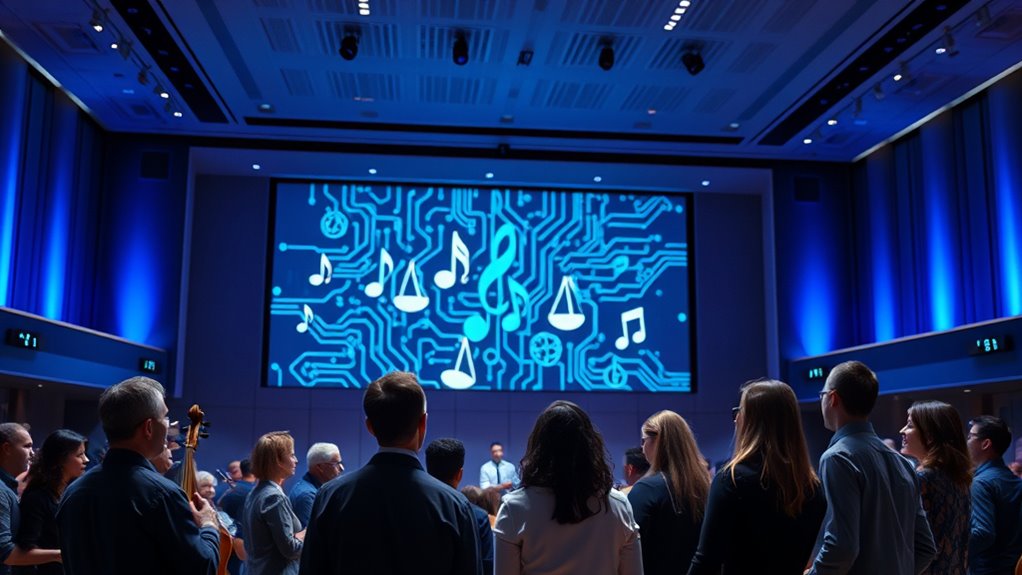The EU AI Act and global laws aim to shape how you develop and use AI in music by emphasizing data privacy, transparency, and protecting creators’ rights. They set strict standards for safety and ethics, impacting everything from AI-assisted composition to music recommendation platforms. These regulations verify your personal data is safeguarded and AI tools are used responsibly. To discover how these laws influence your work and music experience, keep exploring further.
Key Takeaways
- The EU AI Act mandates safety, transparency, and data privacy in AI tools for music creation and recommendation.
- Global laws, inspired by the EU, influence AI regulation in music, balancing innovation and rights protection.
- Regulations aim to prevent unauthorized use of copyrighted music and safeguard artists’ rights across platforms.
- Data privacy laws affect training datasets and how AI systems handle personal and copyrighted music data.
- These laws promote responsible AI development, impacting music discovery, creation tools, and user trust worldwide.

Have you ever wondered how countries are shaping their AI regulations? It’s a topic gaining momentum as governments recognize AI’s transformative power, especially in creative fields like music. The EU AI Act stands out as a pioneering piece of legislation, aiming to establish a holistic framework for AI regulation across member states. Its core focus is on ensuring AI systems are safe, transparent, and respect fundamental rights. As you explore how this impacts music, it’s clear that the regulation emphasizes data privacy and responsible AI development. When AI tools are used to generate or assist in creating music, the EU’s rules encourage developers to prioritize user data protection and prevent misuse. This means that any AI involved in music composition or recommendation must adhere to strict standards to safeguard your personal data and uphold ethical practices. The regulation isn’t just about safety; it’s about fostering trust between creators, consumers, and technology. Additionally, the EU AI Act promotes ethical AI practices, which influence how AI systems are designed and deployed in the music industry. Across the globe, other nations are developing their own AI laws, often influenced by the EU’s approach but tailored to local needs. In the United States, for example, the focus tends to be more flexible, balancing innovation with privacy concerns, but still grappling with issues of data privacy in AI systems used for music streaming, licensing, or creation. Countries like China are implementing AI regulations that emphasize control and security, which can affect how AI-generated music is monitored and distributed. These laws can influence how music platforms collect user data, personalize experiences, and manage copyright issues. When AI models are trained on vast datasets of music, the question of data privacy becomes critical. Regulations aim to prevent unauthorized use of copyrighted material and protect artists’ rights, but they also challenge developers to balance innovation with legal compliance. For you as a listener or creator, these regulations shape the tools and platforms you use daily. They influence how AI recommends new music, how artists collaborate with AI, and how your personal data is handled. The global push for responsible AI regulation aims to foster an environment where creativity flourishes without compromising privacy or ethical standards. In the end, the evolving landscape of AI regulation, driven by frameworks like the EU AI Act, ensures that as music becomes more intertwined with AI technology, your rights and data privacy remain protected. This ongoing development encourages innovation while emphasizing the importance of trust, transparency, and respect for human creativity in the digital age.
Frequently Asked Questions
How Will AI Laws Affect Independent Music Creators?
AI laws will considerably impact you as an independent music creator by enforcing stricter AI licensing requirements, which means you’ll need to make certain you have proper rights to use AI-generated content. These laws aim to protect your creator rights but may also limit how freely you can experiment with AI tools. Staying informed about licensing rules helps you avoid legal issues and maintain control over your music creations.
Are There Specific AI Regulations for Music Streaming Platforms?
Yes, there are specific AI regulations for music streaming platforms. You need to guarantee your platform complies with AI laws related to music licensing and AI compliance. These regulations aim to protect artists’ rights and prevent unauthorized use of copyrighted material. You should regularly review licensing agreements and implement AI systems that adhere to legal standards. Staying updated on evolving regulations helps you avoid legal issues and supports fair use in your streaming services.
Will AI Copyright Laws Change Under New AI Legislation?
They say “the only constant is change,” and that’s true for AI copyright laws too. Under new AI legislation, you can expect copyright updates and licensing reforms to better address AI-created content. These changes aim to clarify ownership and fair use, so you’ll need to stay informed. As laws evolve, they’ll shape how AI influences music creation and distribution, ensuring creators’ rights are protected while encouraging innovation.
How Do AI Laws Impact Music Licensing and Royalties?
AI laws affect music licensing and royalties by creating new licensing challenges for AI-generated compositions. You might find it harder to secure rights or determine ownership, impacting how royalties are distributed. These laws require you to navigate complex regulations around AI-created content, making licensing more complicated. As a result, you need to stay informed about legal developments to guarantee proper licensing and fair compensation for AI-influenced music.
What Are the Penalties for Non-Compliance With AI Regulations in Music?
You might think ignoring AI regulations is harmless, but the liability consequences are severe. If you breach rules, enforcement mechanisms could hit you with hefty fines or legal actions. Non-compliance can lead to reputational damage, restricted access to markets, or even bans on your music projects. So, while it’s tempting to skate by, the penalties make it clear: playing by the rules isn’t just smart; it’s essential to avoid costly consequences.
Conclusion
By balancing bold boundary-setting with thoughtful foresight, the EU AI Act and global AI laws shape a safer, smarter music scene. Staying savvy and supple in this swiftly shifting landscape guarantees you can navigate nuanced nuances with nuance. As regulations rise and rewrite rules, your adaptability becomes your advantage, aligning innovation with integrity. Embrace the evolving environment, and you’ll effortlessly excel in a future where fairness, freedom, and fun fuse flawlessly in music’s marvelous metamorphosis.









